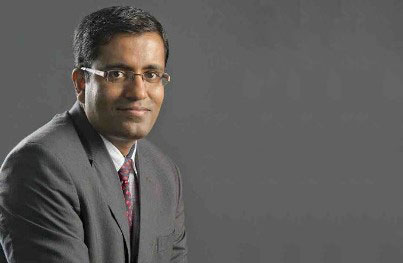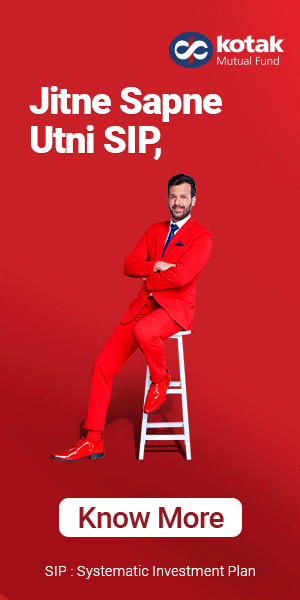Multi cap funds work the best for an average investor over a complete market cycle
BFSI Industry Interview

Mr. George Heber Joseph joined ITI Asset Management Ltd. in November 2018 and is responsible for the entire business of ITI Asset Management Ltd.
George has around two decades of experience and has held positions in Equity Research, Fund Management, Treasury Management and Management Consulting. Prior to joining ITI Asset Management Ltd., he has worked in companies like ICICI Prudential Asset Management Ltd., Tanfac Industries Ltd. (Aditya Birla Group), Cholamandalam Investments & Finance Co. Ltd., Met Life India, Wipro and DSP Merrill Lynch Ltd. based in India and abroad.
His last stint was at ICICI Prudential Asset Management Co. Ltd. Mumbai, where he spent more than a decade managing some of the large flagship fund strategies in the equity and hybrid categories with assets under management exceeding Rs. 10,000 crores. All funds (Multicap, ELSS – Long Term Equity Fund, Child Care) and discretionary portfolios (Wellness, Exports, Flexicap, Largecap, PIPE/Smallcap) managed by him during this entire period were excellent performers in their respective categories. There, he was designated as Senior Fund Manager (Vice President Grade) based in Mumbai, India and was one of the Key Management Personnel in the company and was part of the investment management team.
He is known for his focus on extensive bottom-up research and stock picking capabilities, has overseen fund managers activities, managed various research analysts during his tenure.
George holds dual Bachelor’s Degrees in English Language & Literature and Commerce. He is a qualified Chartered Accountant from Institute of Chartered Accountants of India, New Delhi and a Cost and Management Accountant from Institute of Cost Accountants of India, Kolkata.
ITI Multi Cap Fund was the first equity scheme to be launched by ITI Mutual Fund. Among all the different equity fund categories under revised SEBI norms, why did you decide to launch a multi cap fund as your first equity product offering?
Multi cap funds offer the best flexibility to invest across market cap categories as also across sector. Historically, we have seen that no sector or market capitalization has consistently been a top performer. In CY18, Nifty was the best performer, in CY17 the NSE Small cap was the best performer while in 2016 it was the NSE Mid cap Index. Same is the case with sectors. Investors may not have the expertise to identify which is the best space to invest in at a particular point in time. The fund’s flexible mandate allows fund managers to decide allocation based on where he or she sees most opportunities in terms of risk-reward. Besides, we want to be selective in our fund offerings, and only launch schemes that make most sense to investors. As a multi cap fund fits the criterion perfectly, we decided to start our equity product bouquet with such a product.
Over the last few months, many financial planners/advisors are recommending multi-cap funds to investors in their interviews and blogs. Many of them were recommending large cap funds and index funds/ETFs to clients earlier. Why are multi-cap funds suitable for investors in current conditions?
We feel multi cap funds work the best for an average investor over a complete market cycle. As we have stated earlier, no sector or market capitalisation category (large/mid/small) has consistently been a top performer. A multi cap fund has the full flexibility to move across large/ mid/small cap stock based on market conditions, thereby giving the investor the benefit of participating in the winning category without switching from one scheme to another.
What are your views on the state of the stock market and the economy?
We feel the Indian economy is close to the bottom of economic cycle. Several sectors are going through severe downturn. Corporate profits as a % of GDP at ~2.8% is again close to the bottom and similar to 2003 levels. However, liquidity situation has improved, interest rates and oil prices are low, government spending after a slowdown between September 2018 to July 2019, has started improving. Thus the economy start improving and early signs are visible this festive season. In the stock markets, valuations of many stocks and sectors are below their long term averages. We expect economic recovery to be gradual. This is a very good time to invest into some of the good companies at attractive valuations. As business cycle starts improving, investors get the twin benefits of improved earnings growth and re-rating of valuation multiples. India’s long-term growth outlook continues to remain strong. We feel investors should use the current phase of economic cycle to systematically increase equity exposure with a three year plus time horizon.
Please describe in brief, your stock selection strategy for this scheme?
To generate long-term wealth for our investors, we have based our investment process on the SQL philosophy.
S stands for Margin of Safety – This means the fair value of business minus the current share price. The fund house will look to buy stocks with a good safety margin so that there is more room to generate long-term wealth for our investors.
Q stands for Quality of business – This is crucial as quality businesses are long-term wealth creators. These are strong and sustainable businesses with a track record of good return ratios.
L stands for Low leverage – Low leverage companies are generally cash rich. Therefore, they can invest and grow their business. In addition, high leverage companies are at a greater risk in case of business downturns.
At least 80% of the equity investments are in ‘core’ set of stocks i.e. companies are strong and sustainable businesses with competitive advantages in their respective field and have good capital allocation track record. Tactical bets i.e. companies with significant upside potential but going through temporary problems and at the same time trading at beaten down prices can be taken upto 20% of the portfolio.
The Indian economy has been slowing down for quite some time and several companies across different sectors, especially ones with high debt burden are facing financial crisis. As a new fund, ITI Multi Cap Fund is not burdened with such legacy underperforming stocks as compared to some your peer schemes. What are your views?
There are challenges as well as opportunities in every phase of equity markets. Many of todays beaten down stocks were high fliers in the earlier rally. That’s why we designed our ‘SQL’ investment philosophy, that we feel can stand the test of times. We normally avoid high leverage companies and try to focus on companies that can deliver over long term. We also limit the size of our tactical bets and there too we try to be very particular about the price points at which we make our purchases.
What are your views on the midcap and small cap segments? Are you finding attractive investment opportunities in these segments? How is your scheme portfolio, currently positioned in terms of market cap segments and what is your long term market cap strategy?
Mid and small cap has corrected reasonably well but these are not at all cheap as 2013 October or 2008 October. We look at markets in three different buckets, one is expensive markets 2007 December and 2017 December, then cheap markets 2008 and 2013 October and moderate valuation where we are today.
The best time to buy mid or small cap stocks is when aggregate market valuations are cheap, as you have to deal with the illiquidity issues and also require a longer time frame to reap the benefits.
Our call of preferring large caps over mid and small caps, when we launched our scheme in May 2019, has paid off. With the correction in markets, we have gradually increased our mid and small cap exposure from 15% at end of May 2019 to over 30% now, by adding some mid and small cap stocks that are looking attractive.
The increasing popularity of SIP and growing industry monthly SIP book is a great story for the mutual fund industry and financial awareness in our country. However, many investors still take a short term view when making lump sum investments. What is your general advice to investors who want make lump sum investments in current market conditions?
We feel lump sum investments at one go should be made when markets are very cheap, trading well below long term average multiples. Currently, the markets are neither very cheap nor very expensive. Here the investor wanting to invest lumpsum, may invest 30% immediately and balance over 3-6 month.
Why should investors consider ITI Multi Cap Fund for their equity portfolios?
We use our SQL investment philosophy that focuses both on the ‘quality’ of underlying business and ‘margin of safety’ i.e. the price or valuation that we are paying for the business. We give equal importance to both, which we feel will provide investors with a smoother investment experience. Our focus is to provide investors with reasonable returns, by investing in a portfolio of quality stocks.
Historically we have seen that investors had great opportunities to make money when the economy recovers from a slowdown. We are in the middle of an economic slowdown. How can investors, best position themselves to capitalize on the recovery when it eventually takes place?
Many a times, when the recovery actually happens, stock prices have already run ahead. The best time to invest is when there is uncertainty on the time recovery, when you can good companies trading at companies at attractive valuations. As business cycle starts improving, investors get the twin benefits of improved earnings growth and re-rating of valuation multiples. We feel investors should use the current phase of economic cycle to systematically increase equity exposure with a three year plus time horizon.
Mutual Fund Investments are subject to market risk, read all scheme related documents carefully.
Recent Interviews
-
In conversation with Mr Vaibhav Shah Head Products: Business Strategy & International Business Mirae Asset Mutual Fund India
Apr 18, 2025
-
In conversation with Mr Kaustubh Sule Senior Fund Manager Fixed Income with Groww Mutual Fund
Apr 18, 2025
-
In conversation with Mr Abhishek Tiwari Chief Business Officer of PGIM India Mutual Fund
Apr 5, 2025
-
In Conversation with Mr Akhil Chaturvedi Executive Director & Chief Business Officer with Motilal Oswal Mutual Fund
Mar 26, 2025
-
In conversation with Mr Rohit Seksaria Fund Manager Equity with Sundaram Mutual Fund
Mar 7, 2025
Fund News
-
Axis Mutual Fund joins ONDC Network to Expand Access to Mutual Fund Investments
Apr 18, 2025 by Axis Mutual Fund
-
Nippon India Mutual Fund launches Nippon India Nifty 500 Quality 50 Index Fund
Apr 18, 2025 by Advisorkhoj Team
-
Nippon India Mutual Fund launches Nippon India Nifty 500 Low Volatility 50 Index Fund
Apr 18, 2025 by Advisorkhoj Team
-
RBI Monetary Policy: RBI changes policy stance and lowers rate
Apr 9, 2025 by Axis Mutual Fund
-
Kotak Mahindra Mutual Fund launches Kotak Nifty Top 10 Equal Weight Index Fund
Apr 7, 2025 by Advisorkhoj Team




